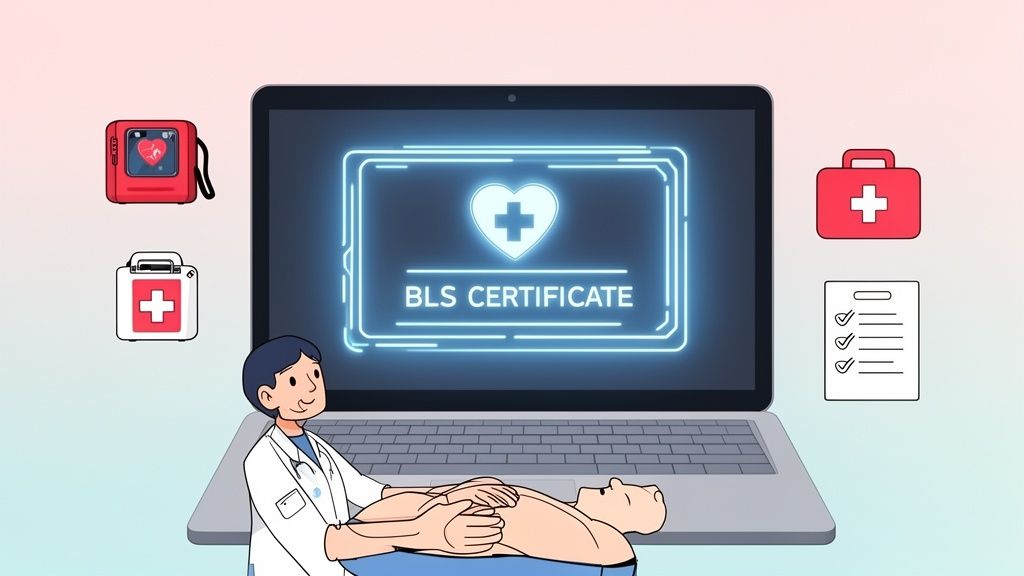3 Life-Saving Skills You Can Learn Online

Learn to Save a Life—Without Leaving Home
Thanks to advances in technology and the accessibility of high-quality online education, healthcare professionals now have unprecedented access to critical life-saving training from virtually anywhere. While most people associate online learning with convenience, for clinicians, EMTs, and nurses, it’s becoming an essential way to sharpen and maintain clinical competency between shifts—without the need to travel or rearrange work schedules.
Whether you're fulfilling a recertification requirement or proactively brushing up on life-saving protocols, here’s how online certifications in CPR, BLS, ACLS, and PALS go beyond just checking a box—and what most professionals miss when they think about learning these skills online.
CPR: More Than a One-and-Done Skill
Cardiopulmonary resuscitation (CPR) is the foundational skill in every emergency response protocol, and it’s often the first intervention performed before any advanced measures are taken. But what most clinicians overlook is this: studies show that CPR skills degrade significantly within just three to six months post-certification. This has implications for both patient outcomes and clinical confidence.
Online certification platforms like ProMedCert provide optional refresher modules, microlearning boosters, and even simulation scenarios designed to promote skill retention—not just test memorization. Building CPR into ongoing continuing education workflows helps ensure you’re not just certified—but actually prepared.
Basic Life Support (BLS): Beyond the Checklist
While many healthcare professionals view BLS as a basic prerequisite, its principles form the foundation for real-time clinical judgment during crises. Online BLS certification can now incorporate interactive scenario training, algorithm logic flowcharts, and real-time feedback simulations to reinforce concepts like high-performance team dynamics and efficient AED usage.
A tip for hospital-based professionals: consider using your online BLS course as an opportunity to review hospital-specific code blue response protocols. Many online platforms allow you to customize case studies or upload your institutional guidelines for side-by-side learning.
Advanced Cardiovascular Life Support (ACLS): Connecting the Dots
ACLS courses are often treated as intensive, once-every-two-year obligations—but clinicians who integrate these protocols into regular learning cycles gain a strategic advantage in acute care settings. Online ACLS certification now frequently includes:
- Dynamic, branching case studies
- Rhythm recognition practice with immediate feedback
- Clinical reasoning modules for interpreting labs alongside ECGs
If you’re a nurse transitioning to ICU or a paramedic preparing for advanced cardiac calls, online ACLS with embedded decision-tree analysis helps bridge textbook knowledge with real-world complexity.
Pediatric Advanced Life Support (PALS): Adapting for Emotional Readiness
PALS is as much about technical execution as it is about emotional intelligence. Pediatric codes are rare and emotionally charged. Online training can integrate trauma-informed communication strategies and child-specific vital norms to help prepare professionals for the realities of pediatric emergencies—something not always covered in classroom training.
For pediatric nurses and school-based clinicians, the ability to replay pediatric code scenarios in a low-stakes environment is invaluable. It allows professionals to build procedural fluency while minimizing emotional overload when emergencies strike.
Skill Retention and CE Integration: An Overlooked Opportunity
One of the biggest gaps in medical education is the divide between certification and continuing education. But smart clinicians are now using certification modules that offer CE credits to satisfy dual requirements—saving time while reinforcing core competencies.
Look for courses that offer:
- Automatic CE tracking and certificates that integrate with CE Broker or state boards
- Flexible credit allocations for license renewal (especially useful for multi-state providers)
- Interactive CE dashboards that remind you when skills are likely to fade
Scope of Practice Considerations
Online training often sparks questions about what different professionals are legally allowed to perform. Understanding your scope of practice is essential. While CPR is universally permissible, interventions like defibrillation or medication administration vary by license and state.
Many online platforms now include state-specific scope-of-practice guidance and delineation tables, which are especially valuable for traveling nurses, paramedics crossing state lines, or physician assistants working under variable delegation models.
Final Thought: Be the One Who’s Ready
Emergencies don’t wait for annual reviews or in-person training days. Whether you're on duty or off the clock, your readiness can mean the difference between life and death. Online certification doesn't just bring convenience—it brings access, agility, and the ability to stay sharp when it matters most.
Explore online CPR, BLS, ACLS, and PALS certification courses at ProMedCert and take the next step in being always prepared.
.avif)
Stay compliant with ProMed+
Certifications included: ACLS, BLS, PALS, CPR & Neonatal Resuscitation
Unlimited continuing education: over 200 hours of accredited CME
All-inclusive: One price. No surprises.
Get certified today
The Advanced Cardiac Life Support (ACLS) is an accredited online medical certification course that teaches medical professionals to respond to nearly all cardiopulmonary emergencies.
The Pediatric Advanced Life Support (PALS) Recertification instructs medical professionals on performing pediatric cardiopulmonary resuscitation in emergencies.
The Basic Life Support (BLS) Recertification is intended to teach healthcare professionals the basic steps of CPR and rescue breathing for adults, children, and infants.
Our online medical certification course for CPR, Automated External Defibrillator (AED), and First Aid is designed to teach adult, child, and infant CPR and AED use.
The Neonatal Resuscitation Certification trains medical professionals in performing resuscitation procedures and life-saving techniques for newborns at the time of delivery.






